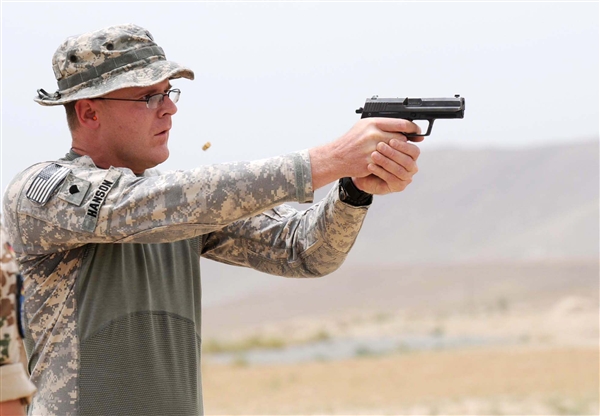WASHINGTON, March 22, 2011 — The two-man crew of a U.S. fighter jet that crashed in Libya is safe, while the coalition has established a no-fly zone and grounded Moammar Gadhafi’s forces, the commander of Joint Task Force Odyssey Dawn said today.
Two airmen ejected from their F‑15E Strike Eagle warplane late yesterday after the plane suffered an equipment malfunction and crashed in eastern Libya, Navy Adm. Samuel J. Locklear III said.
Coalition forces recovered one crew member, and Libyans found the other, he added, noting that both men are now safe and with U.S. forces.
Locklear, commander of U.S. naval forces in Europe and Africa, spoke with Pentagon reporters by phone today from the USS Mount Whitney in the Mediterranean Sea.
Operation Odyssey Dawn was established to enforce U.N. Security Council Resolution 1973, which calls for the protection of Libyan civilians from Gadhafi’s forces and authorizes a no-fly zone over Libya.
“On March 18, the coalition began a graduated, sequenced campaign against the government of Libya … to protect innocent civilians,” the admiral said. “Cruise missile attacks accompanied by significant coalition airstrikes rendered Gadhafi’s long-range air defenses and his air force largely ineffective.”
The coalition includes 13 nations’ forces and multiple ships and submarines, Locklear said, including French and Italian aircraft carriers and a U.S. amphibious assault ship, the USS Kearsarge.
Task force land- and sea-based aircraft include reconnaissance, early warning, attack, fighter and support assets in the air daily to enforce the no-fly zone, Locklear said.
The admiral said Gadhafi’s air force before coalition operations was “not in good repair,” and that his tactical capability consisted of several dozen helicopters. Against those aircraft, he said, “our airstrikes have been very effective.”
While the coalition continues to expand effectiveness of the no-fly zone, the admiral said, forces loyal to Gadhafi still pose a threat to the Libyan people.
“Despite our successes to date … Gadhafi and his forces are not yet in compliance with the United Nations Security Council resolution,” Locklear said, “due to the continued aggressive actions his forces are taking against the civilian population of Libya.”
In announcing U.S. support to the coalition, Locklear said, President Barack Obama laid out expectations that included requiring Gadhafi’s forces to “stop advancing on Benghazi, and they have to pull back from Zawiyah, Ajdabiya [and] Misurata.”
“They have not done that,” the task force commander added, noting that while the coalition has forced regime troops out of Benghazi, they have not pulled back from the other three cities.
If Gadhafi implemented a cease-fire, stopped all attacks against citizens, withdrew from the places the coalition has designated, established water, gas and power supplies to all areas and allowed humanitarian assistance, Locklear said, that would end the operation.
“The fighting would stop,” he said. “Our job would be over.”
Source:
U.S. Department of Defense
Office of the Assistant Secretary of Defense (Public Affairs)

 von
von 
